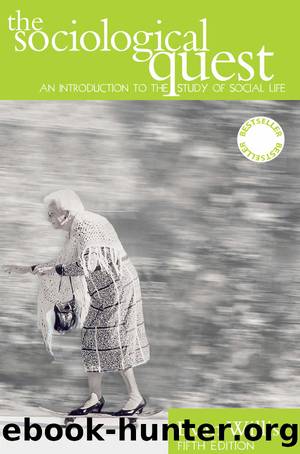The Sociological Quest by Evan Willis

Author:Evan Willis [Willis, Evan]
Language: eng
Format: epub
ISBN: 9781742372822
Barnesnoble:
Publisher: Taylor & Francis
Published: 2011-02-01T00:00:00+00:00
consequences. In order to begin to answer this social and sociological problem, reference to the structure of these societies is necessary. In particular, some reference to the structure of power relationships between men and women in which men dominate, patriarchy, is an essential starting point. To a much greater extent than their Western sisters, African women find it difficult to negotiate about sexuality, as is characteristic of a highly patriarchal society. As a result, HIV prevalence is higher among women than men at 60 per cent (UNHIV/AIDS, 2009). In one study 47 per cent of men and 40 per cent of women in Lesotho indicated that women have no right to refuse sex with their husbands or boyfriends (Andersson et al., 2007). In other words, social factors such as the relative powerlessness of women are important.
There are other social factors as well. Economic opportunities for people to gain livelihoods are structured in such a way that migration in search of work is a major feature of the pattern of life. Many people, particularly African men, must spend long periods away from their homes due to work activities. In such a context the usual constraints on multiple sexual partners are lessened and the likelihood of HIV transmission is much greater. In other words, the spread of the virus has less to do with the characteristics of individuals and more to do with the organisation of the society in which they live.
Failure to take adequate account of the structural level leads to a common way of thinking in our society, which the quest for sociological understanding attempts to overcome. Focusing only on the individual level of analysis to the exclusion of the structural level encourages a sort of rationale or justification for the social phenomena called the ideology of victim blaming. Victim blaming occurs when individuals themselves are held to be responsible for what happens to them. It fails to engage a structural sensibility to also help explain what occurs. An example is rape. While there has arguably been some change for the better in recent times, there is still often the assumption that the woman somehow deserved what happened to her. Either she was wearing clothes that from a male point of view could be defined as âprovocativeâ, she was walking in a âdangerousâ place at an inappropriate time (late at night), she was assumed to have encouraged the man in such a way he was justified to interpret it as a âcome-onâ, or said, ânoâ when he assumed she really meant, âyesâ. In other words, the victim is blamed for what occurred. This approach, still often seized upon by defence counsel as an appropriate line when defending charges of rape, pays inadequate attention to the structural context of patriarchal gender relations in this and other societies, or indeed the rights of women to wear what they want, go where they want or generally act as they want. In all, the victims are blamed for acting like autonomous, âfreeâ members of
Download
This site does not store any files on its server. We only index and link to content provided by other sites. Please contact the content providers to delete copyright contents if any and email us, we'll remove relevant links or contents immediately.
Collaborating with Parents for Early School Success : The Achieving-Behaving-Caring Program by Stephanie H. McConaughy; Pam Kay; Julie A. Welkowitz; Kim Hewitt; Martha D. Fitzgerald(899)
Entrepreneurship Education and Training: The Issue of Effectiveness by Colette Henry Frances Hill Claire Leitch(665)
Adding Value to Policy Analysis and Advice by Claudia Scott; Karen Baehler(499)
Materializing the Middle Passage by Jane Webster;(497)
Race and American Political Development by unknow(488)
Sociological Perspectives of Health and Illness by Constantinos N. Phellas(478)
American Government and Politics Today by Steffen W. Schmidt Mack C. Shelley Barbara A. Bardes(475)
Human and Global Security : An Exploration of Terms by Peter Stoett(464)
Control Of Oil - Hardback by Kayal(463)
Advances in Child Development and Behavior, Volume 37 by Patricia J. Bauer(402)
The Disappearance of Rituals: A Topology of the Present by Byung-Chul Han(399)
The Catholic Church and European State Formation, AD 1000-1500 by Jørgen Møller(389)
The World According to China by Elizabeth C. Economy(379)
Left Is Not Woke by Susan Neiman(370)
Theories of Counseling and Psychotherapy: A Case Approach by Nancy L. Murdock(370)
Application of classical statistics, logratio transformation and multifractal approaches to delineate geochemical anomalies in the Zarshuran gold district, NW Iran by unknow(363)
Cross-Cultural Child Development for Social Workers by Lena Robinson(357)
Turkey's Relations with the West and the Turkic Republics: The Rise and Fall of the Turkish Model by Idris Bal(353)
Japan's Ainu Minority in Tokyo by Mark K. Watson(331)
